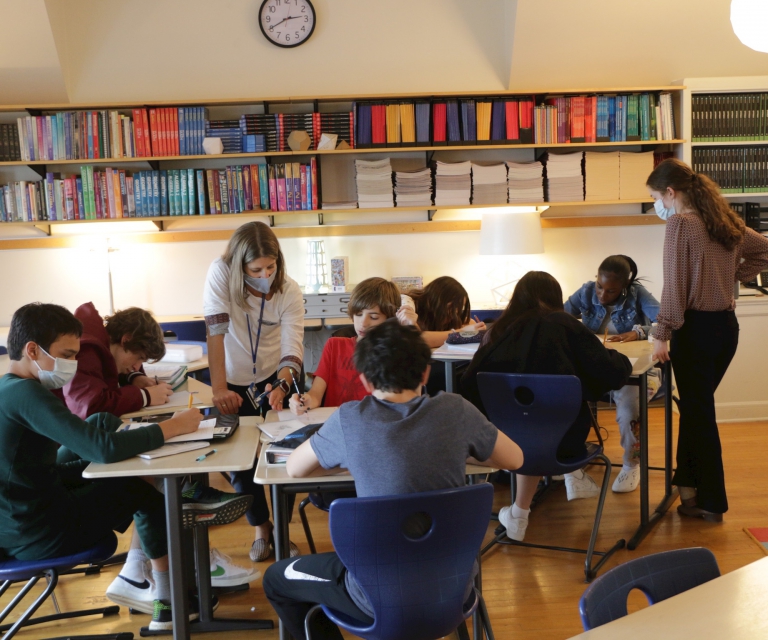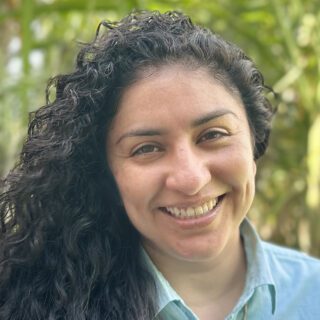
Student Teaching at Falk Laboratory School: Claire Kennedy
The Fanny Edel Falk Laboratory School, a K-8 laboratory school affiliated with the University of Pittsburgh School of Education, serves as a demonstration school: a place where teachers learn to teach. Each year, approximately 20 students from the Pitt School of Education complete their student teaching under the mentorship of Falk teachers.
This is the first profile in a four-part series about student teaching at the Falk Laboratory School, originally published on the school’s website.
Student teacher Claire Kennedy presents the students in Christina Graham’s eighth-grade math class with a choice: would they prefer the five-dollar bill hidden behind her back, or would they rather take one penny doubled every day for one month?
As the students mull this over, a few think ahead, suggesting the calculations they’d need to make to figure out how much that penny, doubled over and over again, would turn into.
“It’s an exponent problem,” one says.
“Hold on,” says Kennedy, a student in the Pitt School of Education’s Master of Arts in Teaching (MAT) Mathematics Education program who is interning at Falk this year. “Let’s think this through.”
Instead of heading right to formulas, Kennedy has the students break into groups to create tables of the penny’s increasing value, then graph those numbers. As the students think aloud together, both Kennedy and Graham, her mentor this year, caution students not to leap ahead.
“The idea was to show the key relationships that we wanted them to pick up on,” says Kennedy later, reflecting on the lesson.
Tables and graphs provide powerful visual representations of those relationships, allowing students to build toward using exponents.
Today’s lesson is the first that Kennedy has led this year, following several weeks of assisting in small groups and observing Graham, who also did her student teaching at Falk while completing the MAT program.
“I was able to see where students were with their thinking and discuss any errors that they made,” says Kennedy. “In math you build upon what you did before, so it was useful to be able to see the little errors and the big conceptual errors that students may have been making.”
It would be easy to minimize the work Kennedy was doing prior to leading today’s lesson, Graham says, but getting to know these students as learners, and letting them get accustomed to Kennedy as a teacher, is critical.
“As you take a more active role,” she tells Kennedy, “that familiarity is really important.”
For this first lesson, Kennedy drew on one that Graham has used in the past.
“I have my repertoire of materials that they’re welcome to,” Graham says, “but they’re also welcome to say, ‘Hey, I want to do this.’ They have the freedom and flexibility to do that. The benefit for me is that if I see something cool, I’m going to use that next year, thank you very much.”
Over time, Graham says, the goal is for Kennedy to develop lesson plans on a daily basis, preparing her for the classroom and the experience of daily preparation. It’s one of the benefits of Kennedy teaching at Falk for the full year.
After the lesson, mentor and intern discuss how it went and Graham gives feedback for Kennedy’s next lesson.
“It was definitely a little nerve-wracking, but for my first time it went well,” Kennedy says. The students were engaged in the activity, and she gained some valuable insights about the questions she asked students to spur their thinking.
Graham draws on her experience in the MAT program in her approach to mentoring Kennedy. What was helpful to her in her growth as a teacher, and what types of feedback were most helpful? She’s tried to strike a balance, she says, between too much feedback and not enough.
As with other Falk Lab School teachers who are now serving as mentors, working with a teacher in training has provided Graham an opportunity to reflect on her own teaching practice.
“There are days where things don’t go as you hoped,” Graham says. “It’s hard when someone who’s learning to be a teacher is in the room, learning with you. But that’s part of what teaching is like on a daily basis. It’s important to talk about it, and for her to see that reflection process. How do you make changes and move forward? I might wish she’d seen that particular lesson implemented more successfully, but that’s an important part of the learning process.”




